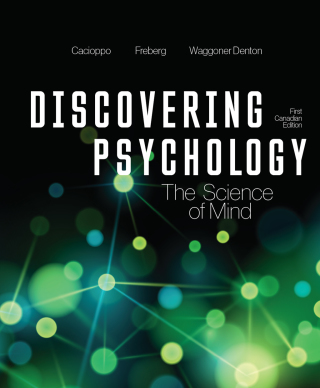Buy DISCOVERING PSYCHOLOGY 1CE, 1st Edition PDF ebook by author Cacioppo, Freberg, Waggoner Denton – published by Cengage Learning Canada Inc. in 2021 and save up to 80% compared to the print version of this textbook. With PDF version of this textbook, not only save you money, you can also highlight, add text, underline add post-it notes, bookmarks to pages, instantly search for the major terms or chapter titles, etc.
You can search our site for other versions of the DISCOVERING PSYCHOLOGY 1CE, 1st Edition PDF ebook. You can also search for others PDF ebooks from publisher Cengage Learning Canada Inc., as well as from your favorite authors. We have thousands of online textbooks and course materials (mostly in PDF) that you can download immediately after purchase.
Note: e-textBooks do not come with access codes, CDs/DVDs, workbooks, and other supplemental items.
eBook Details:
Full title: DISCOVERING PSYCHOLOGY 1CE, 1st Edition
Edition: 1st
Copyright year: 2021
Publisher: Cengage Learning Canada Inc.
Author: Cacioppo, Freberg, Waggoner Denton
ISBN: 9780176877262, 9780176877378
Format: PDF
Description of DISCOVERING PSYCHOLOGY 1CE, 1st Edition:
In this first Canadian edition of Discovering Psychology, Ashley Waggoner-Denton continues John Cacioppo and Laura Freberg’s mission of creating an introductory psychology textbook that presents psychology as a hub sciencea foundation for many other scientific fields. With an integrative approach and evidence-based learning tools, Discovering Psychology truly provides readers with a comprehensive overview of psychology and its many perspectives, without shying from controversies in the field. Updated with fully Canadianized content, updated research, and an approachable writing style, this first Canadian edition tackles all of psychology in a single text, giving readers a basis of psychology that will support their lifelong learning and understanding of human behaviour.
Table of Contents of DISCOVERING PSYCHOLOGY 1CE, 1st Edition PDF ebook:
CoverTitleCopyrightContentsBrief Contents1 The Science of Mind: The Discipline of PsychologyWhat Is Psychology?Psychology as a Hub Science Why Is Psychology a Hub Science?What Are Psychology’s Roots?Psychology’s Philosophical RootsPsychology’s Natural Sciences RootsSummary 1.1How Did the Science of Psychology Begin?Connecting to Research The First Official Psychology ExperimentWilhelm Wundt and VoluntarismStructuralismGestalt PsychologyWilliam James and FunctionalismEarly Psychology in CanadaClinical Roots: Freud and the Humanistic PsychologistsSigmund FreudHumanistic PsychologyExperiencing Psychology Testing Reaction TimeThe BehaviouristsThe Cognitive RevolutionCognitive NeuroscienceSummary 1.2What Are Psychological Perspectives?Five Perspectives of PsychologyA New Connectivity: Integrating Psychology’s Five PerspectivesDiverse Voices in Psychology Culture and Diversity as “Cross-Cutting Themes” in PsychologyThinking Scientifically Can the Use of a Single Perspective Be Misleading?What Does It Mean to Be a Psychologist?Psychology Takes on Real-World Problems Using Psychology to Help Solve Real-World ProblemsSummary 1.3Chapter Summary2 The Measure of Mind: Methods of PsychologyWhat Is Science?The Scientific MindsetThe Importance of Critical ThinkingThe Scientific EnterpriseScientific TheoriesExperiencing Psychology Using Critical Thinking to Evaluate Popular Press ReportsGenerating Good HypothesesEvaluating HypothesesThinking Scientifically Does Psychology Have a Replication Problem?Communicating ScienceSummary 2.1How Do Psychologists Conduct Research?Constructs and OperationalizationsDescriptive MethodsThe Case StudyNaturalistic ObservationThe SurveyFocus Groups and InterviewsDiverse Voices in Psychology How Do We Recruit Diverse Research Participants?Correlational MethodsExperimental MethodsMeta-analysesThe Importance of Multiple PerspectivesPsychology as a Hub Science Testing the Effects of Food Additives on Children’s HyperactivityHow Do We Study the Effects of Time?Summary 2.2How Do We Draw Conclusions from Data?The Importance of Valid and Reliable MeasuresDescriptive StatisticsCentral TendencyVarianceThe Normal CurveDescriptive Statistics with Two VariablesInferential StatisticsConnecting to Research Do You Believe in ESP?How Can We Conduct Ethical Research?Human ParticipantsAnimal SubjectsPsychology Takes on Real-World Problems Using Field Experiments to Test Strategies for Encouraging Conservation BehavioursSummary 2.3Chapter Summary3 The Evolving Mind: Nature and Nurture IntertwinedWhy Do We Say That Nature and Nurture Are Intertwined?What Are the Building Blocks of Behaviour?Psychology Takes on Real-World Problems Using DNA to Find Missing PersonsGenetic VariationRelatednessSex ChromosomesWhich Fields of Genetics Are Relevant to Psychology?Behavioural Genetics and HeritabilityDiverse Voices in Psychology Genetic Research in Indigenous CommunitiesThe Search for Candidate GenesEpigeneticsThinking Scientifically The Genetics of Sexual AggressionConnecting to Research The Lasting Effects of Early Experiences: The Role of EpigeneticsPsychology as a Hub Science Understanding the Epigenetic Influences of NutritionSummary 3.1How Does Evolution Occur?Mechanisms of EvolutionAdaptationEvolution of the Human BrainThe Contemporary Human BrainSummary 3.2How Does Evolution Influence Behaviour?The Evolutionary Psychology PerspectiveOrigins of Social BehaviourSexual SelectionParental InvestmentTraits Possibly Influenced by Sexual SelectionExperiencing Psychology Measuring Individual Differences in Life History Speed, Mating Effort, and Parenting EffortCultureSummary 3.3Chapter Summary4 The Biological Mind: The Physical Basis of BehaviourWhat Is Biological Psychology?Early Attempts to Understand Biological PsychologyThinking Scientifically When Does Reductionism Work? When Does It Fail?Contemporary Approaches in Biological PsychologyConnecting to Research Examining the Brain Activity of a Patient with Acquired SynesthesiaHow Is the Nervous System Organized?Psychology as a Hub Science The Centre for Aging + Brain Health InnovationDiverse Voices in Psychology Integrative Approaches: Cultural NeuroscienceNeurons and Neurotransmitters: Electrochemical CommunicationNeurons and GliaNeural SignallingElectrical SignallingChemical SignallingTypes of NeurotransmittersNeurogenesis and Neuroplasticity: Your Changing BrainSummary 4.1What Are the Structures and Functions of the Central Nervous System?The Spinal Cord, Brainstem, and CerebellumSubcortical StructuresThe ThalamusThe Basal GangliaThe HypothalamusThe HippocampusThe Cingulate CortexThe AmygdalaThe Cerebral CortexLocalization of Functions in the Cerebral CortexThe Frontal LobeThe Occipital LobeThe Temporal LobeThe Parietal LobeMirror NeuronsPsychology Takes on Real-World Problems The Problem of ProcrastinationRight Brain and Left BrainRight-Left Brain MythsThe Function of LateralizationExperiencing Psychology HandednessSummary 4.2The Peripheral Nervous System (PNS) and the Endocrine SystemThe Somatic Nervous SystemThe Autonomic Nervous SystemThe Endocrine SystemDiverse Voices in Psychology Sex and Gender Bias in Neuroscience ResearchSummary 4.3Chapter Summary5 The Perceiving Mind: Sensation and PerceptionHow Does Sensation Lead to Perception?Sensory Information Travels to the BrainThe Brain Constructs Perceptions from Sensory InformationMeasuring PerceptionSignal DetectionSummary 5.1How Do We See?The Visual StimulusThe Biology of VisionRods and ConesVisual PathwaysVisual Perception and CognitionColour VisionPsychology Takes on Real-World Problems Colour and Accessible Web DesignRecognizing ObjectsRecognizing FacesGestalt PsychologyPsychology as a Hub Science Face Recognition: Humans and Machines Working TogetherRecognizing DepthDevelopmental and Individual Differences in VisionSummary 5.2How Do We Hear?The Auditory StimulusThe Biology of AuditionAuditory Perception and CognitionPitch PerceptionPerceiving LoudnessLocalization of SoundAuditory GroupingsDevelopmental and Individual Differences in AuditionSociocultural Influences on Auditory PerceptionDiverse Voices in Psychology Combining Sight with Sound to Help People Learn Indigenous LanguagesHow Do We Feel Body Position, Touch, Temperature, and Pain?Somatosensory StimuliThe Biology of the SomatosensesBody PositionTouchPainSociocultural Influences on the SomatosensesConnecting to Research Do Men and Women Remember Pain Differently?How Do We Process Smells and Tastes?Chemical StimuliThe Biology of the Chemical SensesOlfactionGustationPerception and Cognition in the Chemical SensesExperiencing Psychology Are You a Supertaster?Developmental and Individual Differences in the Chemical SensesSociocultural Influences on the Chemical SensesSummary 5.3Thinking Scientifically Does Losing One Sense Enhance the Others?Chapter Summary6 The Aware Mind: Elements of ConsciousnessWhat Does It Mean to Be Conscious?The Evolution of ConsciousnessConsciousness as Variations in AlertnessConsciousness as an Awareness of Ongoing SensationsConsciousness as Self-AwarenessPsychology as a Hub Science Can Machines Become Conscious?Searching for Consciousness in the BrainSpecific Areas of Brain Damage and ConsciousnessSeizuresThinking Scientifically Can Consciousness Be Shared? The Case of the Hogan TwinsSummary 6.1What Happens to Consciousness During Waking and Sleep?Circadian RhythmsModern Living and Circadian RhythmsIndividual Variations in Circadian RhythmsWakingExperiencing Psychology Chronotype and Sleepiness: Are You a Lethargic Lark?SleepStages of SleepWhy Do We Sleep?Sleep DeprivationPsychology Takes on Real-World Problems Getting More Sleep Can Make People Less BiasedThe Special Benefits of REM SleepDreamsSleep DisordersNightmares and Sleep TerrorsInsomniaConnecting to Research Social Daydreaming, Life Satisfaction, and LonelinessNarcolepsy and CataplexyBreathing-Related Sleep DisordersSudden Infant Death Syndrome (SIDS)Restless Legs Syndrome (RLS)Summary 6.2How Do People Intentionally Alter Their States of Consciousness?General Features of Psychoactive DrugsTolerance and WithdrawalAddictionCommonly Used Psychoactive DrugsCannabisLSDCaffeineDiverse Voices in Psychology Entheogens Across CulturesNicotineCocaine and AmphetaminesMethylphenidate (Ritalin)MDMA (Ecstasy)AlcoholOpioidsNondrug Methods for Altering ConsciousnessHypnosisMeditationOther Methods for Altering ConsciousnessSummary 6.3Chapter Summary7 The Feeling Mind: Emotion and MotivationHow Are Emotion and Motivation Related?The Evolution of EmotionWhat Makes an Emotion?Classic Theories of EmotionThe James-Lange Theory of EmotionThe Cannon-Bard Theory of EmotionThe Schachter-Singer Two-Factor TheoryThinking Scientifically Can Changing Your Facial Expression Change Your Feelings?Contemporary ApproachesConnecting to Research Nausea, Disgust, and Moral JudgmentsThe Biology of EmotionThe Autonomic Nervous SystemThe HypothalamusThe AmygdalaThe InsulaThe Cingulate CortexThe Basal GangliaThe Cerebral Cortex and EmotionAre Emotion Expressions Innate or Learned?Interpreting EmotionExperiencing Psychology Emotional RegulationDiverse Voices in Psychology Culture, Emotional Expression, and the Experience of International StudentsPsychology as a Hub Science Lie Detection and the LawSummary 7.1What Does It Mean to Be Motivated?The Motivation to AffiliateAchievement MotivationHunger and EatingThe Sensation of HungerThe Sensation of SatietyObesityAnorexia Nervosa, Bulimia Nervosa, and Binge-Eating DisorderPsychology Takes on Real-World Problems Promoting Healthy Eating Behaviour in AdolescentsSexual MotivationBiology and Sexual MotivationSexual and Emotional SatisfactionSexual OrientationMotivational PrioritiesApproach and AvoidanceMotivational TheoriesSummary 7.2Chapter Summary8 The Adaptive Mind: LearningHow Do Animals Use Reflexes, Instincts, and Learning to Respond to Their Environment?What Are the Three Main Types of Learning?Thinking Scientifically Learning While You Sleep: Fantasy, Reality, or Something in Between?Summary 8.1What Is Classical Conditioning?Classical Conditioning TerminologyClassical Conditioning PhenomenaAcquisitionExtinction and Spontaneous RecoveryInhibitionGeneralization and DiscriminationHigher-Order ConditioningLatent InhibitionCognitive and Biological Influences on Classical ConditioningThe Element of SurpriseTaste AversionApplying Classical ConditioningOvercoming FearAddictionAttitudes and PrejudiceLatent Inhibition and CreativityPsychology as a Hub Science Classical Conditioning Informs Wildlife ConservationSummary 8.2What Is Operant Conditioning?Types of ConsequencesPositive ReinforcementNegative ReinforcementPunishmentSchedules of ReinforcementDiverse Voices in Psychology Does Physical Punishment Have Different Effects in Different Cultural Contexts?Fixed Ratio SchedulesVariable Ratio SchedulesFixed Interval SchedulesVariable Interval SchedulesPartial Reinforcement Effect in ExtinctionComparing SchedulesThe Method of Successive Approximations (Shaping)Cognitive, Biological, and Social Influences on Operant ConditioningCognitive Influences on Operant ConditioningBiological Influences on Operant ConditioningSocial Influences on Operant ConditioningApplying Operant ConditioningToken EconomiesBehaviour TherapiesExperiencing Psychology How Do I Break a Bad Habit?Summary 8.3What Is Observational Learning?Connecting to Research Social Learning of Food Preferences in Rats: Can Social Learning Override Conditioned Taste Aversion?Albert Bandura and AggressionCultural Transmission of LearningPsychology Takes on Real-World Problems Increasing Voter TurnoutSummary 8.4Chapter Summary9 The Knowing Mind: MemoryWhat Is Memory?Memory Provides an Adaptive AdvantageMemory MetaphorsThe Memory Process: Encoding, Storage, and RetrievalThe Multistore Model of MemorySensory MemoryShort-Term MemoryLong-Term MemoryMoving Information into Long-Term MemoryDifferences Between Working and Long-Term MemoryWhat Are the Different Types of Long-Term Memory?Declarative MemoriesNondeclarative MemoriesProcedural MemoriesPrimingCollective and Transactive MemoryDiverse Voices in Psychology When Collective Memory Rewrites HistorySummary 9.1How Is Long-Term Memory Organized?Connectionist TheoriesInferences: Using SchemasHow Do We Retrieve Memories?Experiencing Psychology Schemas and False MemoriesRetrieval from Short-Term MemoryRetrieval from Long-Term MemoryThe Role of CuesReconstruction During RetrievalPsychology as a Hub Science How Reliable Are Eyewitnesses?Retrieval of Emotional EventsConnecting to Research How Can We Protect Memory Retrieval from Stress?Summary 9.2Why Do We Forget?DecayInterferenceBlocking: Tip of the TongueThe Effects of Motivation on MemoryWhat Is the Biology of Memory?Memory at the Level of the SynapseWorking Memory and the BrainLong-Term Memories and the BrainDeclarative Memories and the HippocampusDeclarative Memories and the Cerebral CortexProcedural Memories and the Basal GangliaBiochemistry and MemoryHow Can We Improve Memory?Distribute Practice over TimeTake TestsExerciseSleepReciteUse MnemonicsThinking Scientifically Can You Improve Your Memory with Brain Games?Psychology Takes on Real-World Problems Preventing Memory LossSummary 9.3Chapter Summary10 The Thinking Mind: Thinking, Language, and IntelligenceWhat Do We Think About?Thoughts as ImagesThoughts as ConceptsDefining Attributes or FeaturesPrototypes and ExemplarsConcepts as TheoriesConcepts and SchemasConcepts and the BrainHow Do We Solve Problems?Understand the ProblemMake a PlanGenerating SolutionsDecide on a SolutionCarry Out the PlanLook BackIndividual Differences in Decision MakingComputer Models of Decision MakingThe Biological Psychology of Decision MakingExperiencing Psychology The Maximization InventorySummary 10.1How Does Language Influence Behaviour?The Origins of Human LanguageThe Basic Building Blocks of LanguageThe Biological Psychology of LanguageLessons from Language DisordersAre Nonhuman Animals Capable of Real Language?How Do We Learn Language?Variations in Language ProcessingDyslexiaBilingualism and MultilingualismSign LanguageConnecting to Research Does Being Bilingual Improve Working Memory Performance?Diverse Voices in Psychology The Loss of Indigenous Sign Languages in CanadaSummary 10.2What Is Intelligence?Early Beliefs About Intelligence: The Eugenics MovementThe Development of Intelligence TestingGeneral and Specific AbilitiesEmotional and Social IntelligencePsychology as a Hub Science How Beliefs About Intelligence Impact EducationBiological Influences on IntelligenceBrain Structure, Brain Activity, and IntelligenceGenetics and IntelligenceExtremes of IntelligenceIntellectual DisabilityGiftedness and GeniusThinking Scientifically Nootropics: Can Taking “Smart Drugs” Increase Your IQ?Psychology Takes on Real-World Problems Encouraging People to Make Smarter Long-Term DecisionsSummary 10.3Chapter Summary11 The Developing Mind: Life Span DevelopmentWhat Does It Mean to Develop?Nature and Nurture IntertwinedContinuity or DiscontinuityUniversal or Ecological DevelopmentHow Do We Change Prenatally?Genetic Risks to DevelopmentEnvironmental Risks to DevelopmentWhat Can Newborns Do?The Newborn’s ReflexesThe Newborn’s ActivityThe Newborn’s Sex and Gender DevelopmentThe Newborn’s SensesSummary 11.1What Physical Changes Occur in Infancy and Childhood?Nervous System DevelopmentMotor DevelopmentGender Development in ChildhoodDiverse Voices in Psychology What Are the Implications of Gender Assignment?How Does Cognition Change During Infancy and Childhood?Jean Piaget’s Theory of Cognitive DevelopmentThe Sensorimotor StageThe Preoperational StageThe Concrete Operational StageThe Formal Operational StageCriticisms of Jean Piaget’s TheoryExperiencing Psychology Using Piaget’s Model to Examine Popular ToysAlternative Approaches to Cognitive DevelopmentLev VygotskyInformation ProcessingNaïve TheoriesTheory of MindHow Do Social and Emotional Behaviours Change During Infancy and Childhood?TemperamentAttachmentParenting StylesConnecting to Research Residential Schooling and Substance Use among Indigenous Peoples in CanadaSummary 11.2What Does It Mean to Be an Adolescent?Physical Changes in AdolescenceSex, Gender, and the AdolescentThe Adolescent BrainCognitive and Moral Development in AdolescenceAdolescent CognitionMoral ReasoningSocial and Emotional Developmen
in AdolescenceIdentity Formation in AdolescencePsychology as a Hub Science Development and the Law: The Youth Criminal Justice SystemThe Benefits of Ethnic IdentityFamily and Peer InfluencesWhat Is It Like to Be a Young Adult?Physical Status in Young AdulthoodCognition in Young Adulthood: Postformal ThoughtRelationships in Young AdulthoodThinking Scientifically The Impact of Social Media on Perceptions of Romantic RelationshipsWhat Happens During Midlife?Physical and Cognitive Aspects of MidlifeSocial Changes in MidlifeWhat Is Late Adulthood Like?Physical Changes in Late AdulthoodCognition in Late AdulthoodSocial and Emotional Aspects of Late AdulthoodPsychology Takes on Real-World Problems Successful Aging in the LGBTQ CommunitySummary 11.3Chapter Summary12 The Individual Mind: Personality and The SelfWhat Is Personality?Historical Approaches to PersonalityHow Do Psychodynamic Theories View Personality?The Id, Ego, and SuperegoFreudian Defence MechanismsPsychosexual Stages of DevelopmentContemporary Assessments of Sigmund Freud’s ApproachThe Neo-FreudiansClassic Behaviourist Approaches to PersonalityHow Do Humanistic Psychologists Approach Personality?How Do Trait Theories Explain Personality?Early Trait TheoriesThe Big Five TheoryHow Do Situations Affect Personality?Experiencing Psychology A Short Version of the Big Five InventoryPsychology as a Hub Science Beyond the MCAT: Does Personality Matter for Medical School?If-Then RelationshipsLocus of ControlDiverse Voices in Psychology How Accurate Are National Stereotypes of Personality?Reciprocal Determinism and Self-EfficacyPsychology Takes on Real-World Problems Increasing Self-Efficacy in StudentsWhat Are the Biological Bases of Personality?Temperament and PersonalityGenetics and PersonalityPersonality, Brain Structure, and Brain FunctionThe Evolution of PersonalityHow Do We Assess Personality?Personality InventoriesProjective TestsAlternative Personality AssessmentsThe Ethics of Personality TestingThinking Scientifically Evaluating the Validity and Reliability of Personality TestsSummary 12.1What Does It Mean to Have a Self?Self-ConceptSelf-AwarenessConnecting to Research Encouraging Truth-Telling in Children by Increasing Self-AwarenessSelf-EsteemSources of Self-EsteemGender, Race, and Culture and Self-EsteemUsing Self-Enhancement to Protect Self-EsteemThe Advantages of Self-EsteemSelf-RegulationThe Brain and the SelfThe Social SelfThe Interpersonal SelfCultural Influences on the SelfSummary 12.2Chapter Summary13 The Connected Mind: Social PsychologyWhy Are Humans So Social?How Accurate Are First Impressions?Experiencing Psychology The UCLA Loneliness ScaleWhy Did That Just Happen?The Correspondence Bias and the Fundamental Attribution ErrorDefensive AttributionsCultural Influences on AttributionHow Are Our Attitudes Influenced by Others?Attitude FormationCognitive DissonanceWhy Does Persuasion Happen?The Elaboration Likelihood ModelRoutes to PersuasionPsychology as a Hub Science Social Media, Persuasion, and Fake NewsThinking Scientifically The Neuroscience of PersuasionSummary 13.1Why Are We Prejudiced?Sources of Prejudice and StereotypingOutcomes of PrejudiceDiverse Voices in Psychology The Shooter BiasReducing PrejudiceWhy Do We Go Along with the Group?ConformityComplianceObedienceEthical Issues in the Stanford Prison Study and Milgram Experiments: Is Social Psychological Research Ethical?Informed Consent and the Use of DeceptionVoluntarinessHow Do Groups Work Together?Social FacilitationSocial LoafingDeindividuationGroup PolarizationGroupthinkSummary 13.2How Well Do We Get Along with Others?Attraction and LikingConnecting to Research She Loves Me, She Loves Me Not: Anticipated Regret and Romantic PursuitBuilding RelationshipsMaintaining RelationshipsEnding RelationshipsSummary 13.3Why Do We Cooperate in Some Situations and Compete in Others?Competition and Cooperation in AnimalsIndividual Differences in Cooperation and CompetitionThe Influence of Culture on Competition and CooperationChoosing Between Cooperation and CompetitionAltruism and HelpingWhy Are We Aggressive?The Biological Psychology of AggressionLearning and AggressionPreventing AggressionPsychology Takes on Real-World Problems Bystanders and CyberbullyingSummary 13.4Chapter Summary14 The Troubled Mind: Psychological DisordersWhat Does It Mean to Have a Psychological Disorder?Can We Predict Who Will Develop a Psychological Disorder?How Are Psychological Disorders Diagnosed?What Do the Psychological Perspectives Tell Us about Disorders?Which Disorders Emerge in Childhood?Autism Spectrum Disorder (ASD)Diagnosing ASDCauses of ASDAttention Deficit Hyperactivity Disorder (ADHD)Diagnosing ADHDCauses of ADHDConduct DisorderDiagnosing Conduct DisorderConnecting to Research Does a Child’s Age Relative to Their Classmates Affect the Likelihood of an ADHD Diagnosis?Risk Factors for Conduct DisorderSummary 14.1What Is Schizophrenia?Symptoms of SchizophreniaCauses of SchizophreniaBiological Factors in SchizophreniaEnvironmental Factors in SchizophreniaWhat Is Bipolar Disorder?What Is Major Depressive Disorder (MDD)?Prevalence of MDDCauses of MDDLearning Explanations for MDDCognitive Explanations for MDDSocial Explanations for MDDBiological Explanations for MDDMDD and Suicide RiskStress and MDDThinking Scientifically Can Media Depictions of Suicide Increase the Risk of Suicide?Integrating the PerspectivesSummary 14.2What Is an Anxiety Disorder?Specific PhobiasSocial Anxiety DisorderPanic DisorderBiological Explanations for Panic DisorderCognitive Explanations for Panic DisorderSocial Explanations for Panic DisorderIntegrating the PerspectivesAgoraphobiaGeneralized Anxiety DisorderBiological Explanations for GADCognitive Explanations for GADSocial Explanations for GADIntegrating the PerspectivesOCD and Related DisordersObsessive-Compulsive Disorder (OCD)Biological Explanations for OCDLearning Explanations for OCDSocial Explanations for OCDBody Dysmorphic DisorderWhat Is Post-traumatic Stress Disorder?Biological Explanations for PTSDLearning Explanations for PTSDSocial and Cultural Explanations for PTSDDiverse Voices in Psychology Post-traumatic Stress Disorder and the Indigenous Peoples in CanadaWhat Are Dissociative Disorders?What Are Somatic Symptom Disorder and Related Disorders?What Are Personality Disorders?Antisocial Personality Disorder (ASPD)Causes of ASPDPsychology as a Hub Science The “Dark Side” of LeadershipBorderline Personality Disorder (BPD)Narcissistic Personality Disorder (NPD)Experiencing Psychology Assessing NarcissismPsychology Takes on Real-World Problems Using Artificial Intelligence to Help Identify Psychological DisordersSummary 14.3Chapter Summary15 Healing the Troubled Mind: TherapyHow Do Psychologists Provide Therapy?Approaches to TreatmentBiological ApproachesPsychological ApproachesEvidence-Based PracticeClinical AssessmentThe TherapistsDelivering PsychotherapyVariations in Length of TreatmentAlternatives to Individual TherapyInnovative Delivery SystemsDiverse Voices in Psychology Culturally Competent Counselling and PsychotherapyContemporary Challenges in TreatmentSummary 15.1Historical Approaches to PsychotherapyPsychoanalysisHumanistic TherapiesContemporary Approaches to PsychotherapyBehavioural TherapiesCognitive TherapiesBiopsychosocial ApproachesWhat Are Biological Therapies?MedicationElectroconvulsive TherapyPsychosurgeryBrain StimulationNeurofeedbackSummary 15.2How Are Specific Disorders Treated?Treating Neurodevelopmental DisordersTreating ASDThinking Scientifically Can Mobile Technologies Improve the Behaviour of Individuals with Autism Spectrum Disorder (ASD)?Treating ADHDTreating Conduct DisorderTreating SchizophreniaTreating Bipolar DisorderTreating Major Depressive Disorder (MDD)Connecting to Research Ongoing Practice of Skills to Prevent Relapse in Major Depressive Disorder (MDD)Treating Anxiety DisordersTreating OCDTreating Body Dysmorphic DisorderTreating PTSDTreating Dissociative Identity DisorderExperiencing Psychology Progressive RelaxationPsychology as a Hub Science Using Virtual Reality (VR) to Treat Anxiety and PTSDTreating Somatic Symptom DisordersTreating Antisocial Personality Disorder (ASPD)Treating Narcissistic Personality Disorder (NPD)Treating Borderline Personality Disorder (BPD)Integration of Specific TreatmentsPsychology Takes on Real-World Problems Moving from Anxiety to Action: Coping with Climate ChangeSummary 15.3Chapter Summary16 The Healthy Mind: Stress and Coping, Health Psychology, and Positive PsychologyWhat Is Stress?The Stress ResponseExperiencing Psychology What Is Your Stress Mindset?Sources of StressWhat Are the Biological and Social Correlates of Stress?Stress and the AmygdalaStress, the Sympathetic Adrenal-Medullary System, and the Hypothalamic-Pituitary-Adrenal AxisGender Differences in the Stress ResponseSocioeconomic Status and StressThe Epigenetics of StressConnecting to Research Life Stressors, Unsupportive Social Interactions, and Depressive Symptoms Among First Nations AdultsHow Does Stress Affect Our Health?Stress and the Immune SystemStress and Heart DiseaseStress, Mood, Sleep, and ObesityAn Integrated View of Stress and HealthPsychology as a Hub Science The Causes and Consequences of Teacher BurnoutHow Can We Cope Effectively with Stress?Managing StressThree Types of CopingResilience: Individual Differences in Response to StressSummary 16.1What Is the Relationship Between Psychology and Health?Behaviour and HealthTobacco UseAlcoholPsychology Takes on Real-World Problems Reducing Binge Drinking Among Postsecondary StudentsNutritionExerciseLoneliness and HealthCulture and HealthAn Integrated Understanding of Health BehavioursSummary 16.2What Is Positive Psychology?Positive EmotionsWhat Is Happiness?Diverse Voices in Psychology Positive Emotions Across Race and EthnicityHappiness and MarriageHappiness and WealthThinking Scientifically Does Parenting Increase Happiness?Can We Increase Happiness?Positive TraitsPositive InstitutionsPositive Psychology and the FutureSummary 16.3Chapter SummaryReferencesName IndexSubject Index





